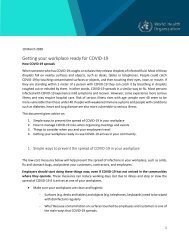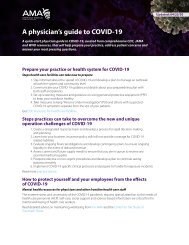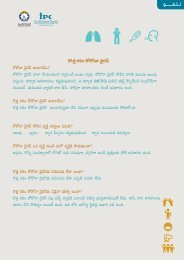WHO - Basic Psychosocial Skills- a guide for covid-19 responders
Basic Psychosocial Skills A Guide for COVID-19 Responders
Basic Psychosocial Skills A Guide for COVID-19 Responders
Create successful ePaper yourself
Turn your PDF publications into a flip-book with our unique Google optimized e-Paper software.
Module 5<br />
Helping in specific situations<br />
Some situations that require specific<br />
considerations during the COVID-<strong>19</strong><br />
pandemic are listed here.<br />
Make sure that people in vulnerable or marginalized situations are not overlooked<br />
Anyone can be in a vulnerable or marginalized situation at different points in their lives. However,<br />
some people, based on the barriers, bias and stigma associated with specific aspects of their identity,<br />
will face these situations more often and with more severity. People in vulnerable situations will likely<br />
need special attention during the COVID-<strong>19</strong> pandemic. Those who may be vulnerable or marginalized<br />
include:<br />
• people at risk of, or currently experiencing, violence or discrimination (e.g. people experiencing<br />
gender-based violence and/or intimate partner violence, which that may escalate during movement<br />
restrictions during the pandemic, LGBTQI people, minorities, migrants, refugees, people with<br />
disabilities)<br />
• older adults, especially those who are <strong>for</strong>getful (e.g. those with dementia)<br />
• pregnant women and people with chronic health conditions who need regular access to services<br />
• people with disabilities, including mental health conditions and psychosocial disabilities<br />
• children, adolescents and their caregivers<br />
• those in crowded living conditions (e.g. prisoners, people in detention, refugees in camps and<br />
in<strong>for</strong>mal settlements, older adults in long-term care institutions, people in psychiatric hospitals,<br />
inpatient units or other institutions) or those who are homeless<br />
• people living alone who have difficulties leaving their home<br />
• people who may have difficulty accessing services (e.g. migrants).<br />
Not all vulnerabilities will<br />
be visible or obvious, so it<br />
is important to respond in a<br />
caring and empathetic way to<br />
everyone you encounter.<br />
Supporting those living in care homes<br />
Those working in care homes (e.g. nursing homes and other<br />
institutions) may face specific challenges. For example, older<br />
people are at higher risk of COVID-<strong>19</strong> infection and are likely<br />
to have a more serious course of illness. They may experience<br />
heightened anxiety, fear and sadness – particularly as isolation<br />
measures may prevent them from seeing loved ones.<br />
Extraordinary circumstances such as<br />
the COVID-<strong>19</strong> pandemic can trigger<br />
violations of human rights and dignity,<br />
including neglect, in institutions. Workers<br />
may feel guilty or powerless to change<br />
the situation, and they may require<br />
additional in<strong>for</strong>mation and training to<br />
ensure that residents’ rights and dignity<br />
are preserved.<br />
Further resources<br />
See the chapter on Older Adults in IASC Operational Considerations<br />
<strong>for</strong> Multisectoral Mental Health and <strong>Psychosocial</strong><br />
Support Programmes During COVID-<strong>19</strong> Pandemic<br />
(<strong>for</strong>thcoming publication).<br />
17












